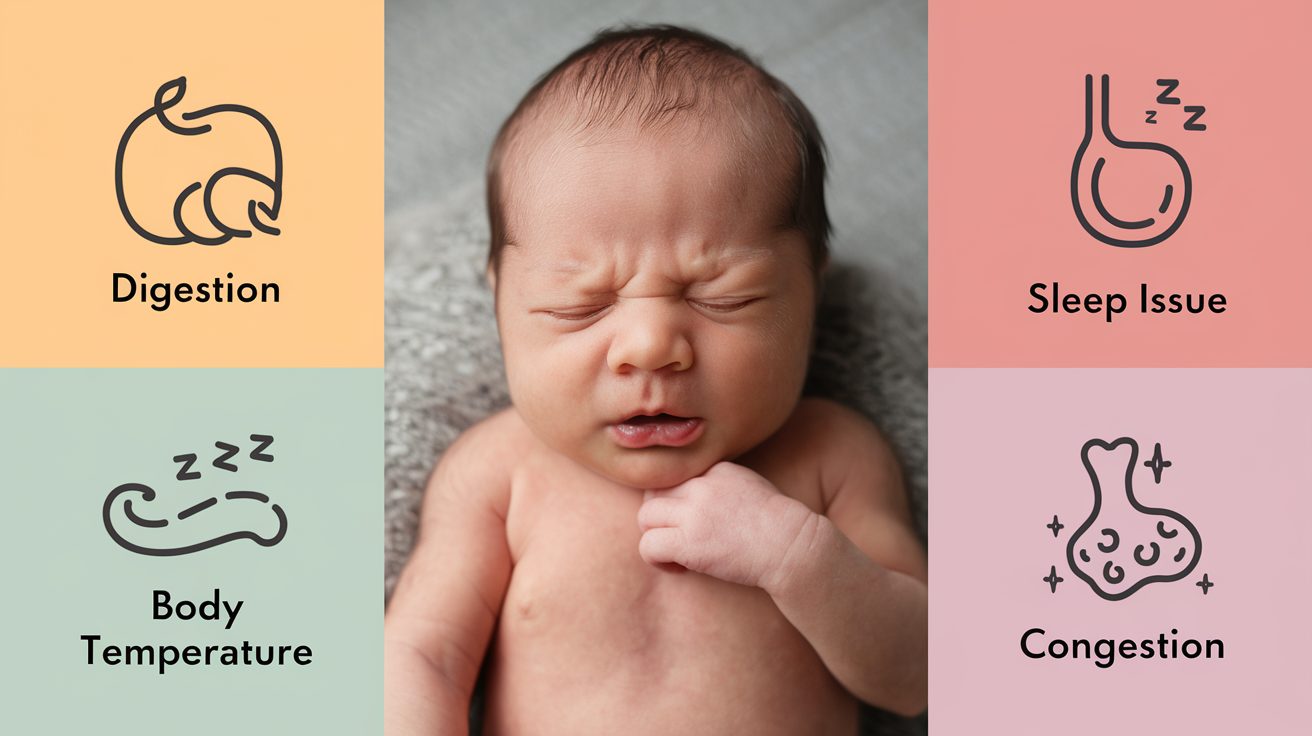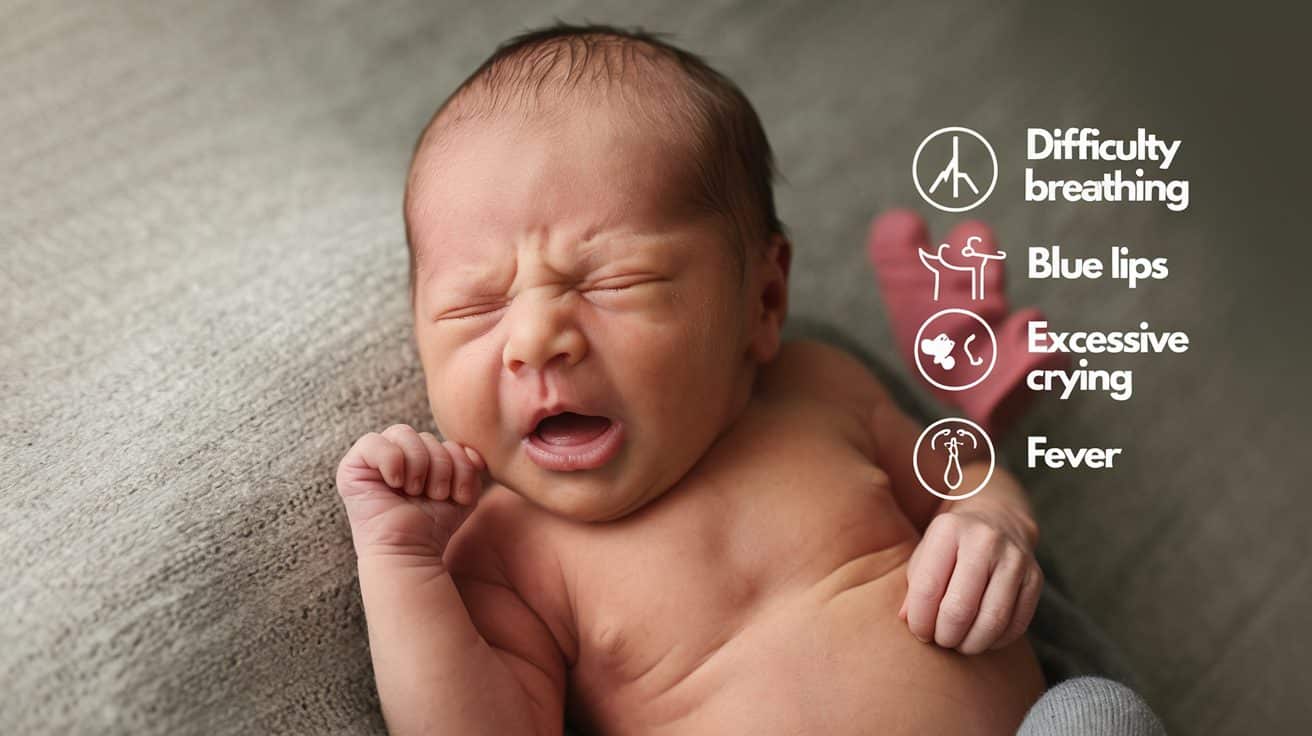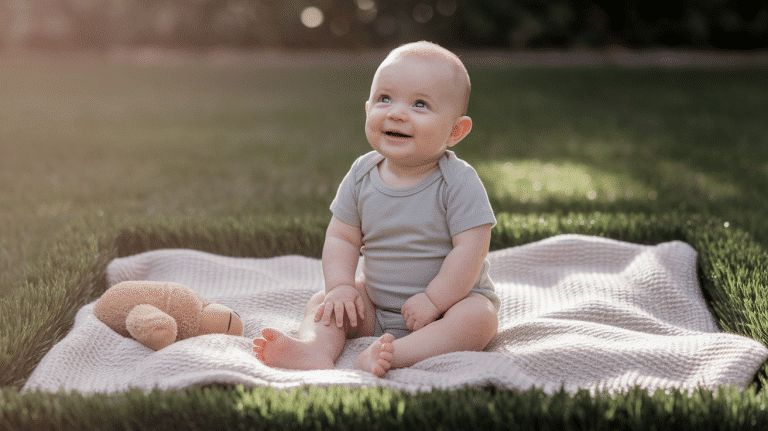“Grunt… squirm… grunt…” That’s your newborn’s midnight symphony, right?
You might wonder if this is normal as you watch your tiny one twist and turn in their sleep, making sounds rivaling a baby piglet.
Take a deep breath – those odd noises during sleep are usually just part of your baby getting used to the world.
Knowing what’s behind these sleep-time sounds can turn those worried moments into peaceful ones.
In this guide, we’ll explain why your newborn grunts and squirms during sleep, what’s perfectly fine, and what to watch for, plus practical tips to help everyone in your home get more rest.
Is It Normal for Newborns to Grunt and Squirm While Sleeping?
Yes, it’s completely normal for newborns to make noises and move during sleep.
All those grunts and wiggles happen because your baby’s body is still learning to work in the outside world. Your baby’s nervous system is still developing, so they move more during sleep than adults.
When your baby is in deep sleep, they’re usually quiet and still. But during light sleep, they might:
- Make grunting sounds
- Move their arms and legs
- Twitch their face
- Change positions
Think of it like this: your baby is practicing all their new skills, even while sleeping!
Does this Grunting and Squirming Last Forever?
Good news – this noisy sleep phase doesn’t last forever! Most babies settle down by 6-12 weeks old. This happens as their tiny bodies get better.
By 3-4 months, you’ll notice your baby sleeping more quietly.
When Does Newborn Sleep Become More Peaceful?
Let’s walk through your baby’s journey to quieter sleep.
In the first 6 weeks, expect lots of noise and movement. Your newborn spends most time in light sleep, making plenty of grunts and squirms. This is completely normal.
Around 6-12 weeks, you’ll start noticing positive changes. The grunting often starts to settle down. Your baby begins to sleep more deeply. Their digestive system works better, leading to less nighttime fussing.
By 3-4 months, most babies sleep more peacefully. Their sleep patterns become more like yours. They’ll spend more time in deep sleep and less time moving around.
If you’re worried about your baby’s sleep sounds after 4 months, check with your doctor.
Causes for Newborn Grunting and Squirming
1. Digestive & Feeding Issues
Pooping is a new skill your baby needs to master. Those gas bubbles get trapped in their belly, causing wiggles and grunts.
Sometimes milk flows back up into their throat, making them uncomfortable. Feeding too much or too little can lead to fussy sleep.
When babies gulp air during feeds, it often leads to extra gas and more squirming.
2. Sleep-Related Factors
Sleep isn’t always quiet for babies. During light sleep, babies move around more – it’s when they’re most active. You’ll notice sudden jerks from their startle reflex, and that’s totally normal.
Your baby often makes noises when they’re hungry between sleep cycles.
3. Breathing & Congestion Issues
Those tiny airways need some getting used to. Babies breathe through their nose, so even slight congestion can sound dramatic.
You might notice them taking little breaks between breaths, up to 5-10 seconds long. Dry or dusty air can bother their sensitive nose, leading to noisy breathing.
4. Body Temperature & Discomfort
Simple things can disturb their sleep. Your baby can’t control their temperature well yet. A swaddle that isn’t just right will make them squirmy.
Even a wet diaper can wake them up and cause extra fussing.
5. Neurological Development
Your baby’s brain and nerves are still growing. Think of it like a new computer system learning to work properly. Some babies show this by moving more in their sleep.
Their muscles might twitch or react strongly to small changes. This extra movement during sleep is just your baby’s nervous system learning to work smoothly.
6. Milk Allergy or Lactose Sensitivity
Sometimes, what your baby drinks doesn’t sit right in their tummy. They might get uncomfortable from formula or even from foods in mom’s breast milk.
Watch for other signs like extra fussiness after feeds. You might notice more spit-up than usual. Some babies get small rashes.
7. Colic-Related Grunting
Colic can make sleep extra noisy. Your baby might cry for hours, usually in the evening. These crying spells often come with more grunting and squirming during sleep.
The good news? The colic usually gets better by 3-4 months. Until then, your baby might be a bit more vocal and wiggly while sleeping.
Solutions to Help Your Baby Sleep Better
1. Easing Digestive Discomfort
Your baby’s tummy needs extra help:
- Try gentle leg exercises – move your baby’s legs like they’re riding a tiny bicycle. This helps them poop and release gas bubbles.
- Make burping a priority – take breaks during feeding to pat their back gently. Special anti-colic bottles can help bottle-fed babies.
- After feeds, hold your baby upright for 20-30 minutes. This simple trick helps keep the milk down and prevents discomfort.
2. Improving Sleep Comfort
Create a cozy sleep space:
- Master the art of swaddling – think snug but not tight. Your baby should still be able to move their legs.
- Set up a peaceful room – soft white noise can block sudden sounds, and dim lights help signal bedtime.
- Back sleeping is safest for night time, but giving plenty of tummy time during awake hours helps development.
3. Helping with Breathing
Keep those tiny airways happy:
- Use a cool-mist humidifier to add moisture to dry air
- For stuffy noses, try saline drops and a soft rubber bulb. Be gentle – their nose is tiny!
- Keep room temperature just right – think spring day warmth (20-22°C)
4. Keeping Your Baby Comfy
Temperature and comfort matter:
- Layer clothes wisely – use light layers you can add or remove easily
- Keep an eye on diaper wetness – a quick change before sleep can prevent wake-ups
- Check their neck – if it’s sweaty, remove a layer. If it’s cool, add one
Remember: Each baby is unique. Try these tips one at a time and see what works best for your little one. Sometimes, finding the right mix of solutions takes a few tries.
When Should You Be Concerned?
Call your doctor right away if you notice these signs along with grunting or squirming:
Breathing Problems: Watch for struggling to breathe – you might see
- The skin pulling in around their ribs
- Nostrils spreading wide with each breath
- Fast breathing that doesn’t slow down
- Any bluish color around their mouth or pale skin
Eating and Growing Issues: Pay attention if your baby
- Stops wanting to feed or fights during feeding
- Isn’t gaining weight as they should
- Throws up often or arches their back in pain during feeds
Signs Something’s Not Right: Get help if your baby
- Makes unusual crying sounds that don’t sound normal
- Seems extra sleepy, and it is hard to wake up
- It is much fussier than usual
- Has a temperature over 100.4°F (38°C) if they’re under 3 months old
Trust your parents’ instincts – if something feels wrong, it’s always okay to call your doctor. It’s better to check and find out everything’s fine than to worry alone.
Baby Sleep Sounds: From Worry to Understanding
Your newborn’s sleep sounds can feel scary at night. All those grunts and squirms might keep you awake. But now you know why they happen.
Your baby is just getting used to the outside world. They’re learning to digest milk. They’re figuring out how to breathe. And yes, they’re even practicing skills in their sleep!
Most babies outgrow these noisy sleep habits by 3-4 months. Until then, try to rest easy, knowing these sounds are normal. But always trust your gut. If something feels wrong, call your doctor.
Has your baby surprised you with funny sleep noises?
Share your story below! Your experience might help other parents feel better during those long night watches.
Frequently Asked Questions
Should I Be Worried if My Baby Grunts While Breathing?
Mild grunting is normal, but rhythmic grunting with fast breathing could indicate an issue.
Can Swaddling Help with Newborn Grunting?
Yes, it provides security and minimizes sudden movements, but it ensures it’s not too tight.
What Are the Best Sleeping Positions for Reducing Grunting?
Always place babies on their backs to sleep, but ensure plenty of daytime tummy time to strengthen their core.













